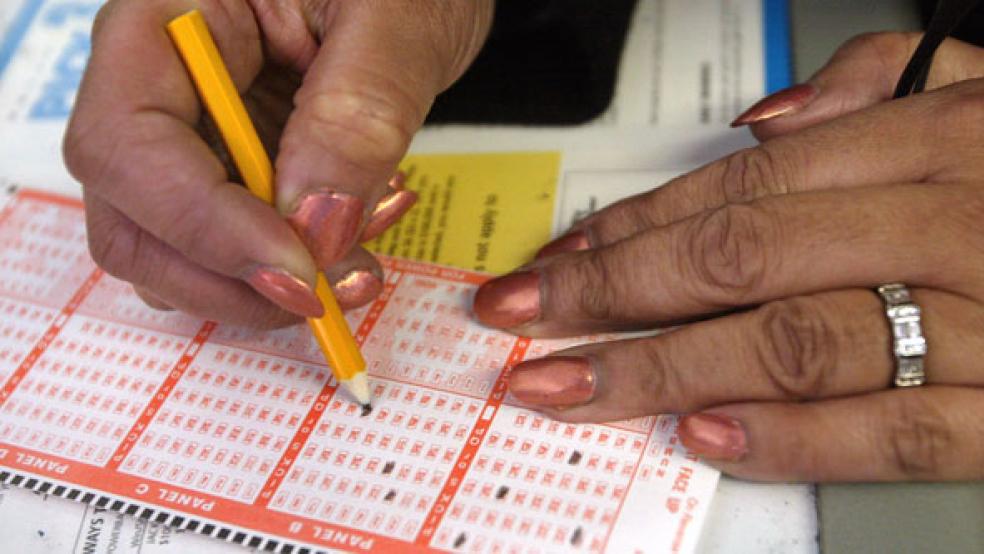Winning Wednesday’s $1.4 billion Powerball lottery would be a game-changer for almost any American. But the high of winning could quickly spiral downward if poor choices and emotional spending replace careful financial planning.
“I would like to think that the sheer amount of this jackpot would be tough to blow entirely,” says Howard Pressman, a financial planner in Vienna, Virginia. “But considering that 70 percent of lottery winners blow it, I think someone could figure this out.”
Here are seven pitfalls that could separate you from your billions if you win the coveted Powerball on Wednesday.
Related: Don’t Be Too Jealous of That Powerball Winner
1. Not securing the ticket
After fainting, laughing, crying and jumping on your couch, sign your ticket and put it in a safe place. Otherwise, say goodbye to your winnings. Last March, a man in California couldn’t claim the $1 million he had won because he lost the winning Powerball ticket. Lottery officials used surveillance video from the supermarket where the ticket was purchased to identify the man, but without the ticket, he got nothing.
2. Shouting from the rooftops
Your first instinct after winning the lottery — to call, post on Facebook or tweet about it — is probably the worst, says Amy Hubble, a financial planner in Oklahoma City.
“The absolute single largest mistake lottery winners make is to claim it publicly under their own names,” she says. “Yes, you get to pose with the big check and pick confetti out of your hair, but it opens you up to a barrage of letters, emails, calls and sob-story solicitations. Beyond that, it compromises your privacy and in many cases your family's safety.”
If you live in the six states that allow lottery winners to stay anonymous — Delaware, Kansas, Maryland, North Dakota, Ohio and South Carolina — then take advantage of that option. If not, contact an estate-planning attorney to draft a non-descriptive trust with a corporate trustee that can claim the winnings, says Hubble. After the winnings go into the trust, the money can anonymously flow out to you.
Related: The Other Powerball Numbers You Need to Know
3. Hiring the wrong people — or no people
As the Notorious B.I.G. said: “Mo money, mo problems.” Getting a financial windfall means more complicated taxes, estate planning and emotional issues. Going at it alone or using people who don’t have your best interest at heart could be devastating, says Lillian Meyers, a financial planner in
Sonoma, California. The key is to find people who have a fiduciary duty to you, a legal responsibly to act in your interest. Great Uncle Phil, the tax preparer, may not make that cut (and could be looking for a cut of his own). Assemble this financial team before or shortly after collecting your winnings.
4. No long-term planning
You may want to stay in the here and now after winning the lottery, but it pays to think about the future, too. Not having a financial plan can lead to many of the problems that have too often plagued lottery winners.
With a professional’s help, put together a cash flow model that shows what money is going in and coming out, what assets you own and what returns those assets are earning, says Neil Waxman, a financial planner in Shaker Heights, Ohio. This will help you meet long-term goals and make smart decisions when it comes to spending, charitable giving, investing and creating trusts for children.
5. Spending too much
It’s hard to fathom spending down a billion dollars, but it is possible. “Lottery winners can afford just about anything, but they can't afford everything,” says Kevin Reardon, a financial planner in Pewaukee, Wisconsin. “It's important to prioritize your goals.”
Related: New Powerball Rules Make It Harder to Win Big
He recommends carving out a specific amount to spend in the first year, then creating an annual budget from that experience that you can stick to. If you’re still worried about overspending, appoint a third party as a co-trustee to monitor your spending, he says.
Another idea is to put your winnings into reputable annuities that will guarantee regular paychecks for your life, but keep the money locked away from your overspending ways, says George Gagliardi, a financial planner in Lexington, Massachusetts. “This is an approach that good advisors use with professional athletes who have short, high paying careers,” he says.
6. Investing in bad ideas
Family, friends and strangers will come from all corners to pitch so-called winning business plans. Be wary of poorly thought-out business ideas and pure scams, says David Haas, a financial planner in Franklin Lakes, New Jersey.
“The winner will be inundated with business plans and investment opportunities,” he says, “many of which are more designed to part the winner from their winnings rather than make any money.”
If you want to help someone out, consider giving out a loan with generous terms. But get it in writing, with the loan amount, interest rate, payment schedule, monthly payment, penalties, security interest and default recourse all spelled out.
7. Bailing out family
Along with euphoria, winning the lottery can come with guilt and pressure to solve financial problems for family and friends. It’s fine to help others out with your newfound wealth, says Reardon, but make rules for yourself and them. An annual gift amount is a savvy way to keep greedy relatives at bay.
Tell them, "This is how much we are giving you each year, and nothing else,” Reardon says. “Practice saying ‘no’ when asked for money.”





